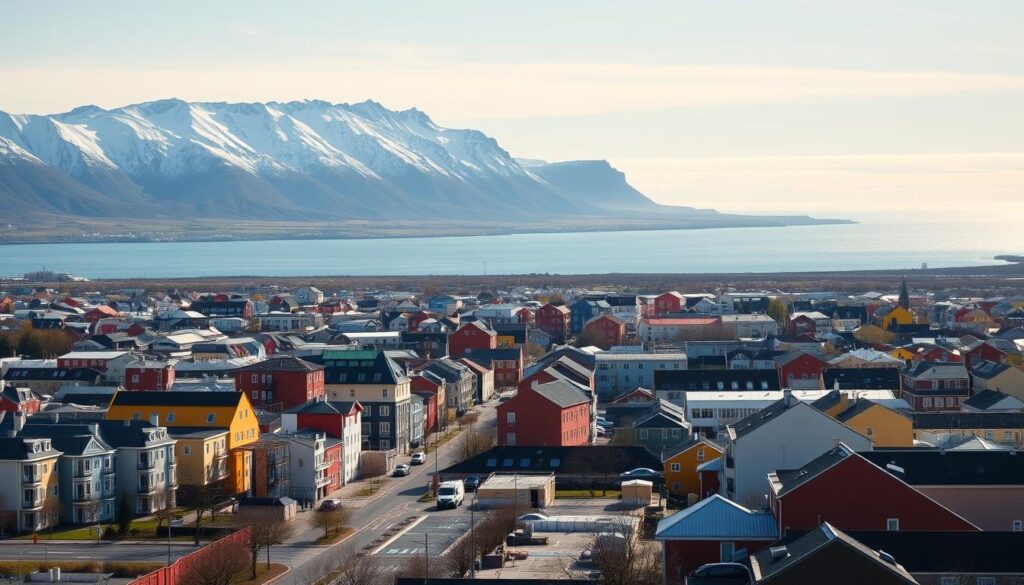Handling money wisely is key for those living in Iceland, as living costs are high. Learning how to manage your finances improves your budgeting abilities. This leads to a stable financial life. This article will share tips fit for Iceland’s cost of living. It aims to help both old and new residents. By applying these tips, you can do well financially in Iceland’s dynamic economy.
Understanding Iceland’s Cost of Living
Iceland is among the world’s most expensive countries, ranked 14th. High costs for housing, food, and transportation greatly affect everyday life. Knowing these costs is key to budgeting well in such an expensive place.
Anúncios
The Ranking of Iceland Among Expensive Countries
Being isolated with limited resources makes Iceland expensive. Goods and services cost more due to high transport fees. Renting is especially pricey, making it tough for both locals and newcomers.
Major Expenses for Iceland Residents
Housing, food, and transportation are the big expenses in Iceland. These areas greatly influence the overall cost of living.
- Housing: High demand and little supply make renting a big part of monthly spending.
- Food: With many imported goods, grocery and restaurant prices are high.
- Transportation: Car rentals, fuel, and domestic flights significantly add to living costs.
With smart budgeting, people can handle these costs. This ensures a balanced life despite the expenses.

Practical Budgeting Techniques
Learning how to budget effectively is a must for handling money in Iceland. A solid monthly budget sorts spending, spots saving chances, and hits financial targets. Knowing how to make a monthly budget can make a big difference for your money health.
Creating a Monthly Budget
The first step in making a monthly budget is to list all income sources. Then, figure out what expenses are fixed and which ones can change. Rent and utility bills are fixed costs, while money for food and fun changes. Knowing these numbers helps people see their financial status better and find ways to save.
Using Budgeting Apps for Tracking Expenses
Budgeting apps like YNAB and Mint are really helpful. They let people keep an eye on their spending easily and in real-time. These apps help list budget areas, limit how much you spend, and warn you about your buying habits. Using these tech tools helps people manage their money better and budget more wisely.
Money Management Strategies for Living in Iceland
In Iceland, knowing how to manage money is key because costs are high. By following smart financial habits, you can live sustainably and reach your money goals. Creating a budget for your income and spending will make you more financially secure and less worried.
Tips for Effective Money Management
Here are some tips to make the most of your money:
- Prioritize needs over wants: Focus on essential expenses to ensure financial stability.
- Minimize unnecessary subscriptions: Regularly review monthly bills to eliminate services that are not used.
- Opt for cashless payments: Take advantage of rewards programs offered by credit cards and apps.
- Utilize budgeting tools: Employ apps or spreadsheets to keep track of your progress toward savings.
Setting Financial Goals
Having clear financial goals keeps you motivated. Try these strategies:
- Set short-term goals, such as saving for a vacation, to generate quick rewards.
- Identify long-term goals, like obtaining a home, to shape a more comprehensive strategy.
- Regularly reassess your goals to align with changing circumstances and priorities.
Finding Affordable Living Options
Looking for affordable places to stay in Iceland is easy. Many people use Airbnb for cost-effective options compared to hotels. Guesthouses are also great. They offer a local feel and help you save money.
Exploring Airbnb and Guesthouses
Airbnb in Iceland lets you find charming places to stay without spending a lot. You get to enjoy:
- More space and amenities than a hotel room
- A variety of locations all over Iceland
- Chance to get tips from local hosts about the area
Starting at $150 per night, guesthouses are an affordable choice. They give a cozy feeling with shared spaces, making it easy to meet others.
Cost-Effective Local Amenities
Residents can save more by using local amenities. Shops like Bónus and Krónan have low prices on groceries and more. This is how you can keep your spending down:
- Buy in bulk when you can
- Use loyalty programs for extra discounts
- Shop during sales for the best deals
With affordable places to stay and wise shopping, living in Iceland can be budget-friendly. You can enjoy what this amazing country offers without spending too much.
Smart Eating Out Choices
Eating out in Iceland can be costly, but there are clever ways to enjoy meals without spending too much. Many places have lunch deals that are both tasty and light on the wallet. By choosing a bigger lunch and a smaller dinner, people can save money and still enjoy Iceland’s food scene.
How to Enjoy Dining Without Overspending
Here’s how you can make the most out of dining out:
- Look for restaurants with good lunch specials, usually around $25.
- Choose buffets in cafes, which offer many dishes for one price.
- Go to local places that use ingredients from the area to save money.
Opting for Affordable Lunch Specials
There’s a variety of affordable lunch options in Iceland. These deals include local and international dishes at lower prices than dinner. On sunny days, consider making a picnic with items from local stores. This approach allows for enjoying good food while being mindful of spending.
Transportation Savings in Iceland
Iceland’s landscapes are beautiful but traveling can be expensive. It’s important to pick the best way to travel to save money. Comparing the cost of renting a car with the price of public transport is key.
The Benefits of Renting a Car
Having your car in Iceland means more freedom. Many amazing places are hard to reach by bus. With a car, you can go wherever you want, whenever you want. This can be cheaper than paying for tours or waiting for buses.
The money spent on a car rental can be worth it. You can visit many spots all in one day.
Utilizing Public Transportation Efficiently
Public transport is good for short trips in the city. Reykjavik’s buses can take you to lots of places easily. This is a cheap way to move around for those staying in the city.
Knowing the bus times and routes helps a lot. This way, you can enjoy Iceland’s beauty without spending too much.
Managing Entertainment Expenses
In Iceland, fun costs can quickly rise. To keep a healthy budget, folks should look for joy without breaking the bank. They should focus on free attractions. Iceland has a lot to offer in natural beauty and cultural richness.
Choosing Free Attractions
Many amazing places in Iceland are free. Think about visiting:
- National parks like Þingvellir, where scenic hikes await
- Goðafoss waterfall, a breathtaking natural landmark
- Laugavegur, a lively street in Reykjavík with vibrant local culture
By checking out these free spots, you can lower your entertainment costs. At the same time, you get to see the real Iceland.
Selective Sightseeing for Budget Travelers
Choosing carefully what to see can make your trip better while saving money. Identify must-see spots and plan your budget. This can include:
- Using city cards, like the Reykjavík City Card, for discounts on famous places
- Visiting well-known spots at less busy times to dodge crowds
- Checking out local events or festivals, which are usually free or cheap
With these tips, you can sightsee on a budget. And you won’t miss out on the experiences Iceland offers.
Grocery Shopping and Meal Prep
Shopping for groceries in Iceland smartly can really help you save money while cooking. Stores like Bónus and Krónan are great for finding what you need without breaking the bank. They have lots of discounts and sales, perfect for anyone trying to keep their food costs low.
Best Supermarkets for Iceland Residents
- Bónus: Known for its low prices and special offers.
- Krónan: Offers a wide range of products with competitive pricing.
- Fresh and local markets: Benefit from seasonal produce at reasonable rates.
Preparing Meals for Cost Savings
Prepping your meals is a great way to be organized and save money. It helps you make healthier choices and saves you time during the week. Plus, cooking at home is usually cheaper than eating out.
Meal prep also lets you be creative and try different recipes with basic ingredients. It’s good for buying food wisely and using everything you buy. This helps cut down on waste and teaches you to use food smartly.
Money Management Tips for Traveling Within Iceland
Exploring Iceland lets you see stunning nature and rich culture. But to fully enjoy it without breaking the bank, consider some money-saving tips. Planning and smart decisions can make every journey affordable yet unforgettable.
Cost-Saving Travel Hacks for Local Adventures
Heading out to see Iceland’s amazing views? Keep these tips in mind:
- Book accommodations early to secure the best rates.
- Utilize local resources such as community boards for recommendations on free or low-cost attractions.
- Participate in city tours that highlight local history while providing insights on budget-friendly dining options.
- Take advantage of off-peak travel times to avoid higher prices.
Splurging Wisely on Unique Experiences
Sometimes, spending a bit more can make your trip even better. Look for special opportunities that are truly worth it:
- Invest in authentic culinary tours that showcase Icelandic cuisine.
- Join guided excursions to hidden gems that are not easily accessible on your own.
- Participate in cultural events or local festivals that offer immersive experiences.
Conclusion
This summary talks about key money tips for people living in Iceland. We’ve looked at how to manage money well, considering Iceland’s high costs. By using good budgeting tricks, folks can handle the pricey nature of Iceland and make smart money moves.
Keeping an eye on spending helps people control their money better. These tips are a great help for those wanting a better life in Iceland, without missing out on what they need. By watching how they spend, people can have a more stable money situation.
The money advice we’ve shared gets even more important as Iceland’s economy changes. Being smart with budgets and spending can really change how you deal with money. This lets you enjoy all the cool things Iceland has, while keeping your money healthy.
FAQ
What are the biggest financial challenges for residents in Iceland?
How can I effectively manage my monthly budget?
What strategies should I employ to save on groceries in Iceland?
Are there affordable dining options available in Iceland?
What are effective money management strategies for travel within Iceland?
How can I prioritize my financial goals while living in Iceland?
Are there any free attractions in Iceland worth visiting?
What tips can I use for effective transportation savings?
Conteúdo criado com auxílio de Inteligência Artificial



